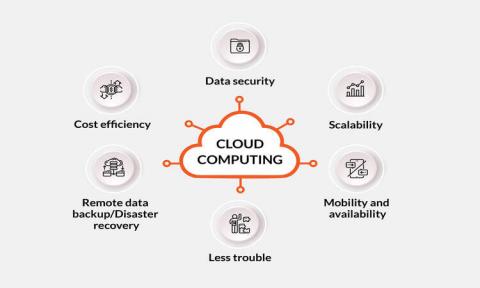The Future of Cloud Computing

Cloud computing has revolutionized the world of computing. It has emerged as a technology that offers a wide range of benefits to businesses, individuals, and governments alike. It has transformed the way we store, access, and manage data, and has enabled the rapid development and deployment of new applications and services. In this blog, we will explore the concept of cloud computing and its potential impact on our lives.
What is Cloud Computing?
Cloud computing is a model of delivering computing services over the internet. It involves the use of remote servers that are hosted on the internet to store, manage, and process data, rather than using a local server or personal computer. The term "cloud" refers to the internet, and cloud computing involves the delivery of computing services such as software, storage, and processing power over the internet.
Types of Cloud Computing
There are three types of cloud computing:
Infrastructure as a Service (IaaS): This is the most basic form of cloud computing, where the provider offers virtualized computing resources such as storage, networking, and processing power. The user can deploy and run their applications on this infrastructure.
Platform as a Service (PaaS): This model offers a complete development and deployment environment for applications, including operating systems, development tools, and databases.
Software as a Service (SaaS): This is a complete software solution that is delivered over the internet, such as email, customer relationship management (CRM), and enterprise resource planning (ERP) software.
Advantages of Cloud solutions
Cloud computing offers several advantages over traditional computing models. Here are some of them:
Cost Savings: Cloud computing eliminates the need for businesses to invest in expensive hardware and software. Instead, they can pay for the computing resources they use, making it a more cost-effective option.
Scalability: Cloud computing offers businesses the flexibility to scale their computing resources up or down as per their changing needs. This means they can easily accommodate sudden spikes in traffic or demand.
Accessibility: With cloud computing, users can access their data and applications from anywhere in the world, as long as they have an internet connection.
Security: Cloud computing providers invest heavily in security measures, such as data encryption and access controls, to protect their customers' data from cyber threats.
Challenges of Cloud Computing
While cloud computing offers several benefits, it also poses some challenges, including:
Dependency on the Internet: Cloud computing is entirely dependent on the internet, which means that any disruptions to internet connectivity can disrupt services.
Data Security: Despite the security measures put in place by cloud computing providers, there is still a risk of data breaches and cyber-attacks.
Compliance and Regulation: Businesses must comply with various regulations, such as the General Data Protection Regulation (GDPR) when using cloud computing services.
Conclusion
Cloud computing has emerged as a game-changer in the world of computing. It offers several advantages over traditional computing models, including cost savings, scalability, accessibility, and security. However, businesses must also be aware of the challenges of cloud computing, including dependency on the internet, data security, and compliance with regulations. Overall, cloud computing has the potential to transform the way we work and live, and it is likely to remain a vital technology in the years to come.
